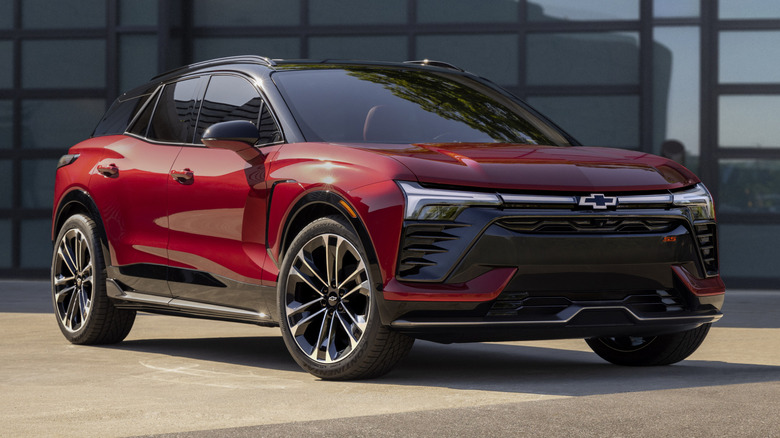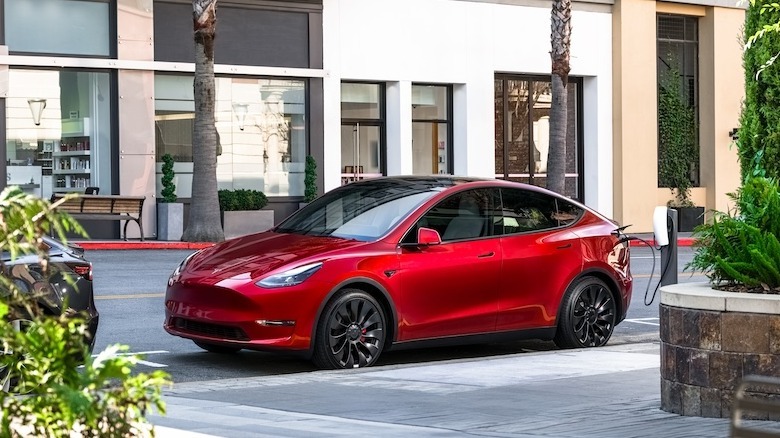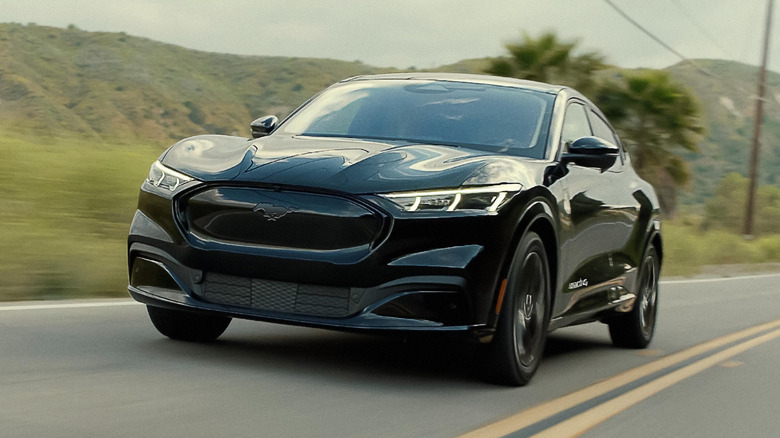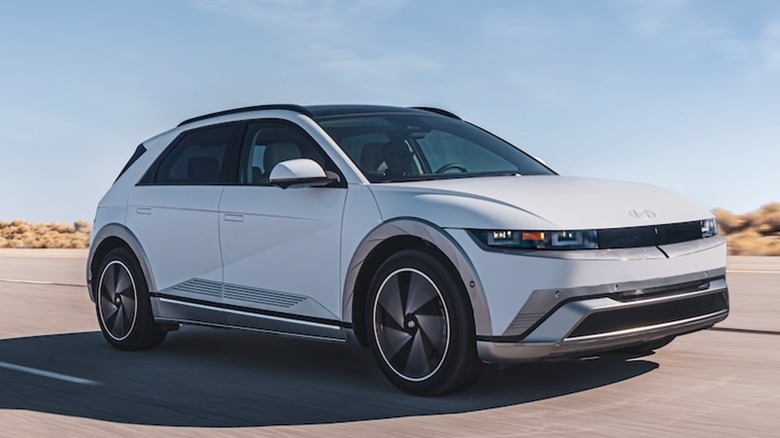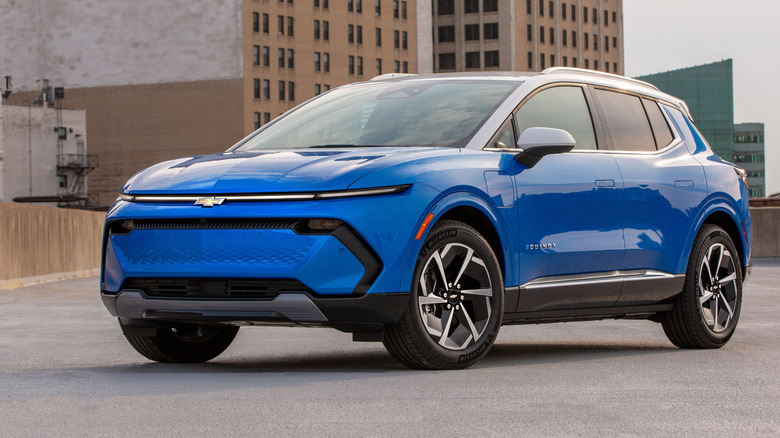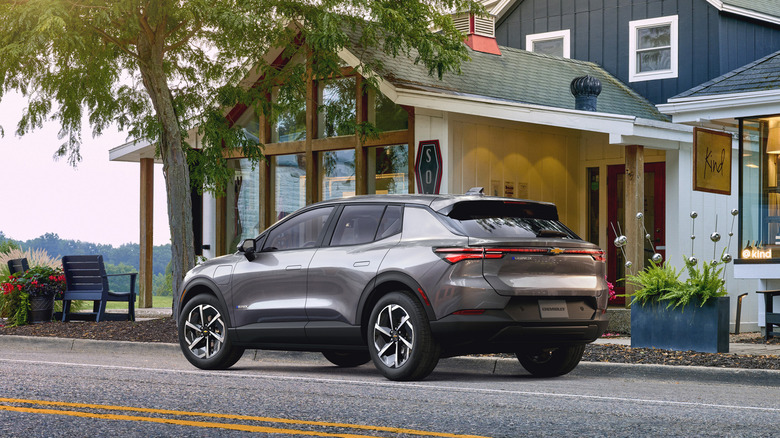The Biggest Problem With EVs Has Nothing To Do With Range Or Tech (Hint: It's Price)
Tesla used to be the king of EVs when it came to pure technical specifications. A few years ago, if you wanted the fastest, longest range electric car, you bought a Tesla. However, competing models from so-called legacy automakers have come a long way on a technical level, even just within the last half-decade. Your average EV from any automaker like Ford, Hyundai, Kia, or General Motors is going to be ridiculously quick to accelerate compared to a gas-powered car; most have well over 200 miles or even 300 miles of range; and most can charge within just a few minutes. 2024 (soon to be 2025) is a great time to buy an EV.
When it comes to selling points and specs, most automakers have not only caught up with Tesla but have even surpassed the company when it comes to build quality, style, onboard tech, and — a factor of growing importance to many shoppers — not being run by Elon Musk. For all that, though, Tesla still sold and delivered 462,890 cars last quarter, with 439,975 of those cars being the Model 3 or Model Y. Comparatively, Hyundai sold 11,590 Ioniq 5s and 2,185 Ioniq 6s in the same period; General Motors, as an entire company, managed to deliver 32,095 EVs.
Tesla is clearly doing something to persuade customers to buy its cars in numbers substantially higher than the competition, and it isn't by making a better EV. It's making a cheaper EV.
Current EVs in numbers
Take, for example, two popular electric vehicles with decent reputations among car fans: the Ford Mustang Mach-E, and the Hyundai Ioniq 5. Both have undeniable advantages over the equivalent from Tesla, the Model Y. Style is subjective, but I'd argue that neither the Mach-E nor the Ioniq 5 look like an orca on the outside or an IKEA-furnished doctors office on the inside. The minimal-ized to death interior of the Model Y precludes a lot of the bells and whistles you would find in either the Ford or the Hyundai.
Range from both are pretty comparable to the Model Y's EPA-estimated 320 miles (itself short of Tesla's advertised 337 miles) with the Mach-E topping out also at 320 miles with its extended range battery and the 2025 Ioniq 5 achieving 318 miles.
So why does Tesla sell 400,000+ EVs a quarter, even though the cars aren't really any better? A large part of that is because the Tesla Model Y starts at $44,990 when you strip away all the deceptive "offers" and "estimated savings" that Tesla loves to advertise. Both the Mach-E and the Ioniq 5 have lower MSRPs at $39,995 and $41,800 respectively, but, when you start comparing base models, the case for the Model Y becomes clearer.
Hyundai's $42,500 base model Ioniq 5 SE only nets you 245 miles of range, a full 100 miles less than the Model Y. The base Mach-E "Select" trim can only achieve an estimated 250 miles of range. It's a simple question of value. The Tesla Model Y, warts and all, gets you more for the money. To the average buyer who outright doesn't care about the optics or political implications of buying from a company like Tesla, value wins 99 times out of a hundred.
All about value and a glimmer of hope
To buy an equivalent to the Tesla Model Y, that is a five-seater crossover with 320 miles of range, from a legacy automaker, you need to spend a significant amount of cash. The extended range 320 mile battery on the Ford Mustang Mach-E is only available on the Premium trim and will set you back a hair under $50,000. The Hyundai Ioniq 5's 318 mile range model starts at just under $50,000.
The Chevy Blazer EV might as well not even be in the competition, with its starting price over $58,000 for the rear-wheel drive 324 mile range RS trim. The all-wheel drive versions are cheaper, but only allow you a range of 279 miles and will still set you back over $51,000 for the privilege. The only glimmer of hope for GM comes in the form of the Chevy Equinox EV, as it starts at just over $43,000. and boasts a 319 mile range. Kia's EV6? That starts at over $42,000 for just 232 miles of range: to get into Tesla Model Y territory, you have to spend over $45,000 for the 310 mile range "Light Long Range" trim.
It's not range, it's not tech, it's not batteries, it's not Elon Musk (at least not yet) that make people buy a Tesla over the other litany of better options out there. It's price and the inability (or maybe outright refusal) of other automakers to make an EV that competes where it matters most, the wallet.
What's the solution here?
Tesla probably isn't going to lead the pack in sales forever. That's just a matter of economics, even before you get to the optics issue of who's in charge of the company. Elon's pride and joy is only able to undercut the competition because the Tesla manufacturing process has been slimmed down. The brand rarely updates its lineup and there's no huge array of options for a new Tesla like with other EVs, that complicates — and thus makes more expensive — the manufacturing process. Both of those factors, combined with a regularly-questioned build quality, result in EVs that are relatively inexpensive.
Can those legacy automakers compete? Certainly, they could pick up the slack through slimming down their options lists — without forsaking quality, of course — and streamlining production to cut costs in a way that's palatable to customers, maybe more importantly, people who are switching from Tesla or becoming first-time EV buyers.
General Motors and Ford are able to sell literally millions of gas trucks and SUVs a year, at prices people can readily get onboard with. It's absolutely within their powers to use the same manufacturing know-how with regards to EVs. It just takes a little less hubris, and a little more creativity.
